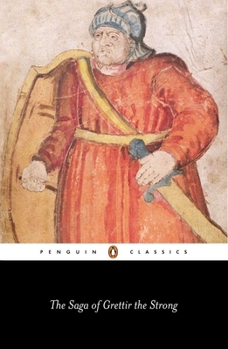The Saga of Grettir the Strong
(Part of the Íslendingasögur/Sagas of Icelanders Series)
Select Format
Select Condition 
Book Overview
Composed at the end of the fourteenth century by an unknown author, The Saga of Grettir the Strong is one of the last great Icelandic sagas. It relates the tale of Grettir, an eleventh-century warrior struggling to hold on to the values of a heroic age becoming eclipsed by Christianity and a more pastoral lifestyle. Unable to settle into a community of farmers, Grettir becomes the aggressive scourge of both honest men and evil monsters - until, following a battle with the sinister ghost Glam, he is cursed to endure a life of tortured loneliness away from civilisation, fighting giants, trolls and berserks. A mesmerising combination of pagan ideals and Christian faith, this is a profoundly moving conclusion to the Golden Age of the saga writing. For more than seventy years, Penguin has been the leading publisher of classic literature in the English-speaking world. With more than 1,700 titles, Penguin Classics represents a global bookshelf of the best works throughout history and across genres and disciplines. Readers trust the series to provide authoritative texts enhanced by introductions and notes by distinguished scholars and contemporary authors, as well as up-to-date translations by award-winning translators.
Format:Paperback
Language:English
ISBN:0140447733
ISBN13:9780140447736
Release Date:November 2005
Publisher:Penguin Group
Length:320 Pages
Weight:0.56 lbs.
Dimensions:0.8" x 5.2" x 7.7"
Age Range:18 years and up
Grade Range:Postsecondary and higher
Customer Reviews
3 ratings
Good edition of a great saga
Published by Thriftbooks.com User , 15 years ago
Grettir's Saga is sometimes called the Last of the Great Icelandic Sagas. It was composed decades after Njal's Saga for example, and shows mastery of the literary techniques in the earlier sagas. Any saga reader should read this saga in some translation, and this translation is accessible. The saga tells the story of Grettir Asmundarson, a cruel child turned great warrior, outlawed for a crime he didn't commit, and eventually killed by his opponents. It is a masterful tragedy about a romantic hero, unromantically viewed. I am now going to spend some time discussing what I don't like about this translation. I think the translator's choice to move genealogies into footnotes is distracting, and disrupts the typical feel of the Icelanc Sagas. A second issue is that the introduction is weaker than I have come to expect from, say, the Penguin editions. The author of the introduction spends most of his time doing a literary critique of the story rather than looking at wider areas of inquiry such as what this story has to tell us about heroic motifs in Germanic literature, or what the overall historical context of the story was. While these do not doom the book entirely, they are marks against it. At the same time, the translation is accessible and easy to read. All in all I would recommend this version, though I am slightly disappointed in it.
Warrior, Outlaw, and Poet
Published by Thriftbooks.com User , 23 years ago
In the definitive 5-volume COMPLETE SAGAS OF ICELANDERS, Grettir's Saga is situated in the volume entitled "Warriors, Outlaws, and Poets." For the story of Grettir Asmundarson, all three are appropriate. From an early age, the gigantic Grettir the Strong allows no man to show him disrespect without challenging him to a duel to the death. After one too many challenges, the combined Icelandic chieftains at the Althing sentence him to outlawry, which means, in essence, that anyone could kill him at any time without being held responsible. For a period of 19 years, Grettir moves from one part of Iceland to another, living on isolated farms or in the wild -- either alone or together with friends and sympathizers -- while relatives of those whom he had killed follow him around, setting up mostly unsuccessful ambushes. Finally, he settles on the islet of Drangey with his brother Illugi and a servant. One local farmer who owns the islet and the flock of sheep that feed there resorts out of desperation to having a magical spell placed on him that causes him to be injured, making it easy for him to kill the brothers. But because Christianity has taken root in Iceland, the chieftains are outraged at the use of magic to kill Grettir. The farmer is assailed on all sides until HE is declared an outlaw; and Grettir's half-brother chases him all the way from Norway to Constantinople avenge his death. Even while an outlaw, Grettir had visited many of the chieftains, including the legendary Snorri Priest of Eyrbyggja Saga fame, and met with sympathy. Had he lived another year, the decree of outlawry would have expired, and he would have been a free man. Grettir had good and bad qualities in abundance, including a ready wit and a meticulous sense of honor. His poems are razor sharp and earthy. Once you get past the Icelandic genealogies at the beginning, this saga reads more rapidly than any of the others I have read. It one of the most readable -- and loveable -- works of the entire Middle Ages.
Grettir's Saga is an unsung, masterful tragedy.
Published by Thriftbooks.com User , 25 years ago
Like all Icelandic saga's, a reader must give Grettir's Saga its first few chapters before it takes hold. The opening lightly traces the violent heritage of Grettir's ancestors before coming to him. Naturally this slows the story, but once Grettir is born it turns into a slightly fantastic, darkly ironic story of a man haunted with incredible strength and an uncontrollable temper. Grettir's only true talent is fighting, but the saga does not justify his actions. The application of his ability, even under just circumstances, brings him constant misery. At its resolution, there's a subtle, pro-pacifist message of undying relevance. This is a must read for anyone in need of an engaging adventure with great moral depth.






